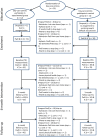Cost-effectiveness of exergaming compared to regular day-care activities in dementia: Results of a randomised controlled trial in The Netherlands
- PMID: 34657346
- PMCID: PMC9544668
- DOI: 10.1111/hsc.13608
Cost-effectiveness of exergaming compared to regular day-care activities in dementia: Results of a randomised controlled trial in The Netherlands
Abstract
The growing number of people living with dementia will result in increased costs of dementia worldwide. The e-Health intervention 'Exergaming' may improve health and quality of life of people with dementia, but the cost-effectiveness is unknown. We assessed the cost-effectiveness of exergaming compared to regular activities from a societal perspective in day-care centres (DCC) for people with dementia and their informal caregivers (IC) alongside a cluster randomised controlled trial. We included 112 dyads (person with dementia and IC) from 20 psychogeriatric DCCs (11 exergaming, 9 control) across the Netherlands. Exergaming consisted of interactive cycling at least twice a week for 6 months. Measurements were conducted at baseline (T0), after 3 (T1) and 6 (T2) months. Primary outcomes were minutes of physical activity, mobility of the participants with dementia (Short Physical Performances Battery, SPPB), and Quality-Adjusted Life-Years (QALYs) of participants with dementia and ICs. ICs filled out cost diaries to measure healthcare and informal care utilisation during the study. There were no statistically significant differences in outcomes or costs between the groups at the level of participants with dementia, the ICs or the dyad. With regard to QALYs and SPPB, the probability that exergaming is cost-effective compared to control was low for all possible willingness-to-pay (WTP) thresholds. However, for physical activity at WTP thresholds of 0, 50 and 250 Euros per additional minute of physical activity, the probability of cost-effectiveness is 0.46, 0.84 and 0.87, respectively. Exergaming in DCC was not cost-effective compared to usual activities. However, considering the small sample size and the large number of missing observations, findings should be interpreted with caution. Future studies with larger samples are recommended to obtain definitive answers on the cost-effectiveness of exergaming. This trial was registered in the Netherlands Trial Register (NTR5537/NL5420).
Keywords: costs and cost analysis; dementia; exercise; healthcare costs; physical fitness; quality of life; randomised controlled trial.
© 2021 The Authors. Health and Social Care in the Community published by John Wiley & Sons Ltd.
Conflict of interest statement
All authors declare that they have no competing interests.
Figures


Similar articles
-
The (cost-) effectiveness of exergaming in people living with dementia and their informal caregivers: protocol for a randomized controlled trial.BMC Geriatr. 2019 Feb 19;19(1):50. doi: 10.1186/s12877-019-1062-x. BMC Geriatr. 2019. PMID: 30782127 Free PMC article. Clinical Trial.
-
Effects of Exergaming on Cognitive and Social Functioning of People with Dementia: A Randomized Controlled Trial.J Am Med Dir Assoc. 2020 Dec;21(12):1958-1967.e5. doi: 10.1016/j.jamda.2020.04.018. Epub 2020 Jul 7. J Am Med Dir Assoc. 2020. PMID: 32651132 Clinical Trial.
-
Cost-effectiveness of the FindMyApps eHealth intervention vs. digital care as usual: results from a randomised controlled trial.Aging Ment Health. 2024 Nov;28(11):1457-1470. doi: 10.1080/13607863.2024.2345128. Epub 2024 May 6. Aging Ment Health. 2024. PMID: 38708873 Clinical Trial.
-
Effects of Exergaming in People with Dementia: Results of a Systematic Literature Review.J Alzheimers Dis. 2018;63(2):741-760. doi: 10.3233/JAD-170667. J Alzheimers Dis. 2018. PMID: 29689716 Free PMC article.
-
Multi-gene Pharmacogenomic Testing That Includes Decision-Support Tools to Guide Medication Selection for Major Depression: A Health Technology Assessment.Ont Health Technol Assess Ser. 2021 Aug 12;21(13):1-214. eCollection 2021. Ont Health Technol Assess Ser. 2021. PMID: 34484487 Free PMC article.
Cited by
-
Cost-effectiveness of physical activity interventions for prevention and management of cognitive decline and dementia-a systematic review.Alzheimers Res Ther. 2023 Sep 25;15(1):159. doi: 10.1186/s13195-023-01286-7. Alzheimers Res Ther. 2023. PMID: 37749587 Free PMC article.
-
The Effectiveness of Home-Based Exergames Training on Cognition and Balance in Older Adults: A Comparative Quasi-Randomized Study of Two Exergame Interventions.Innov Aging. 2023 Sep 16;7(8):igad102. doi: 10.1093/geroni/igad102. eCollection 2023. Innov Aging. 2023. PMID: 37941829 Free PMC article.
-
The Costs of Dementia in Europe: An Updated Review and Meta-analysis.Pharmacoeconomics. 2023 Jan;41(1):59-75. doi: 10.1007/s40273-022-01212-z. Epub 2022 Nov 15. Pharmacoeconomics. 2023. PMID: 36376775 Free PMC article.
-
Cost-Effectiveness of Non-pharmacological Interventions for Mild Cognitive Impairment and Dementia: A Systematic Review of Economic Evaluations and a Review of Reviews.Pharmacoecon Open. 2023 Nov;7(6):887-914. doi: 10.1007/s41669-023-00440-z. Epub 2023 Sep 25. Pharmacoecon Open. 2023. PMID: 37747616 Free PMC article.
-
Exergaming for dementia and mild cognitive impairment.Cochrane Database Syst Rev. 2024 Sep 25;9(9):CD013853. doi: 10.1002/14651858.CD013853.pub2. Cochrane Database Syst Rev. 2024. PMID: 39319863 Free PMC article.
References
-
- Alzheimer Nederland . (2019). Factsheet cijfers en feiten over dementie. Retrieved from https://www.alzheimer‐nederland.nl/factsheet‐cijfers‐en‐feiten‐over‐deme...
-
- Corregidor‐Sánchez, A. I. , Segura‐Fragoso, A. , Rodríguez‐Hernández, M. , Criado‐Alvarez, J. J. , González‐Gonzalez, J. , & Polonio‐López, B. (2020). Can exergames contribute to improving walking capacity in older adults? A systematic review and meta‐analysis. Maturitas, 132, 40–48. 10.1016/j.maturitas.2019.12.006 - DOI - PubMed
Publication types
MeSH terms
LinkOut - more resources
Full Text Sources
Medical

